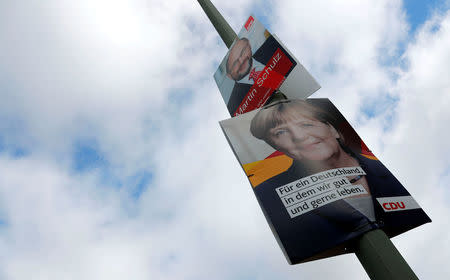Germany's Schulz says he would demand U.S. withdraw nuclear arms

BERLIN (Reuters) - The leader of Germany's Social Democrats (SPD) pledged to have U.S. nuclear weapons withdrawn from German territory if, against the odds, he defeats Angela Merkel to become chancellor next month. Addressing a campaign rally in Trier late on Tuesday, SPD leader Martin Schulz also said he, unlike Merkel, would resist demands by U.S. President Donald Trump for NATO members to increase their defense spending. "Trump wants nuclear armament. We are against this," Schulz said, apparently trying to differentiate his party from Merkel's more hawkish Christian Democratic Union (CDU). "As chancellor, I will commit Germany to having the nuclear weapons stationed here withdrawn from our country," he said. About 20 U.S. nuclear warheads are thought to be stationed at a military base in Buechel, in western Germany, according to unofficial estimates. The U.S. embassy in Berlin said it does not comment on nuclear weapons in Germany. Taking advantage of Trump's extreme unpopularity in Germany, Schulz also said he would use the money Merkel had earmarked for increased military spending for other purposes. "What to do with our money is the central question of this election," he said, referring to a 30 billion-euro tax surplus. "Trump demands that 2 percent of GDP, 30 billion euros, should go to military spending, and Merkel agreed to that without asking German citizens." Germany and other NATO members had already pledged to raise their defense spending to 2 percent of gross domestic product before Trump was elected. While most of them have increased spending on their militaries, only a few have reached the 2 percent goal, and Germany is not one of them. Most recent polls show Schulz's party polling at around 24 percent, some 14 percentage points behind Merkel. Most expect a booming economy and low unemployment will carry her into a fourth term in Sept. 24 elections. However, with Germans historically wary of using military force since World War Two, Schulz's message may resonate among the SPD's core voters. After 12 years in office, Merkel has become increasingly confident on the global stage. She has pushed for Germany to become more militarily self-reliant, partly in response to Trump's hinting that he might abandon NATO allies if they do not spend more on defense. Earlier this year, Merkel said the times when Germany could rely on others to defend it were "to some extent in the past" . (Reporting By Thomas Escritt)

